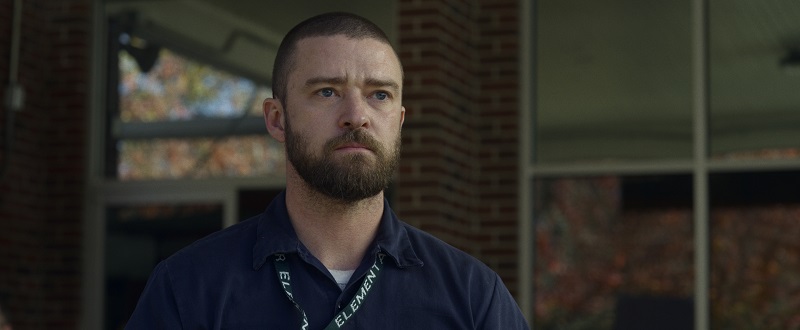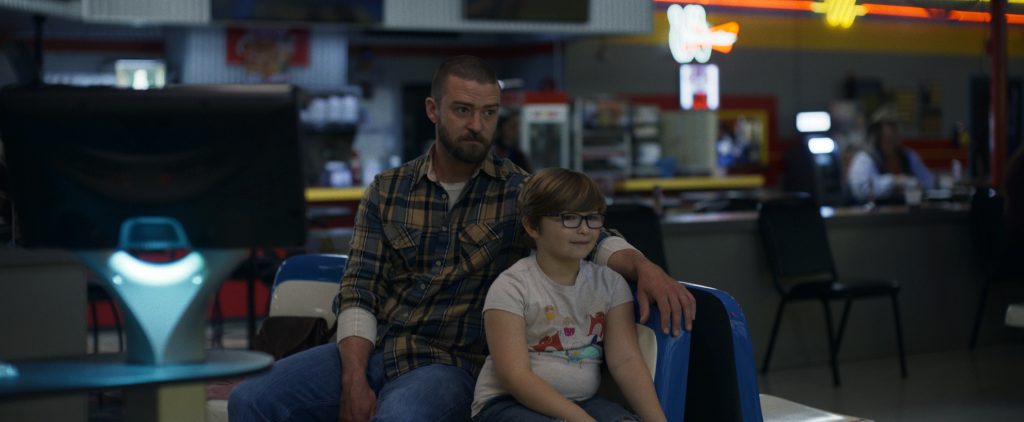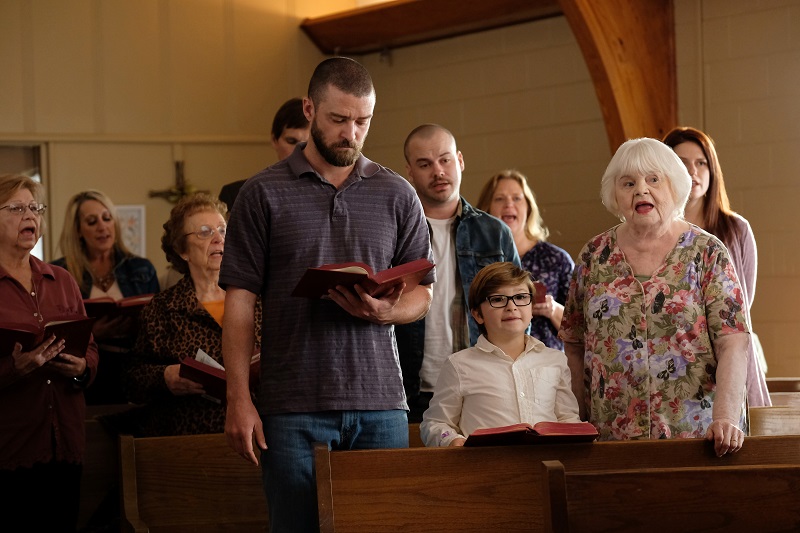Justin Timberlake plays the title character in Palmer, and despite the fact that he is sensationally terrific, the scene-stealer of this Apple+ heart-warmer is Ryder Allen as Sam. The two meet under the most innocent of circumstances, but each has the most prolific effect on the other’s life.

Timberlake is Eddie Palmer, a felon who is just getting out of jail after serving his 12-year-sentence for his role in a nefarious situation. He’s a changed man, even if he doesn’t think so or society isn’t treating him as such. There to greet him, house him, and to generally support him is his beloved grandmother, Vivian (Oscar nominee June Squibb, for Nebraska). Her only requirement is that he keeps his nose clean and gets a job. Eddie has no problem with either. In fact, he cannot wait to start his next chapter.
Living next door in a trailer that may or may not be on Vivian’s land is Juno Temple’s Shelly. She’s Sam’s mom and has a penchant for disappearing with random guys for weeks at a time. So, yes, Vivian is essentially raising the little boy, which provides the most fascinating of landscapes for our title character. Sam needs/seeking a male role model, there is an instant spark between Sam and Palmer—even if the latter doesn’t show any outward interest.
This illustrates something interesting without utilizing much screen time. Palmer is a good soul. Children can see through fakery and the way that Sam is interested in Timberlake’s character unconsciously tells us that there is good in Palmer’s soul, even if it is hardened at the moment.
Witnessing Sam and Eddie’s relationship progress, ever-slowly is at the heart of what brings so much smile-producing joy to Palmer. Handling the pitch-perfect tone and progression of the narrative is director Fisher Stevens. The actor/director is a face you couldn’t forget who has steadily honed his helming craft over the years, learning from the best and cutting his teeth on documentaries and music videos.
This is all led to this moment and a film that required a director with a keen eye for pacing, emotional progression, and structure. He has over 100 credits as an actor (from 1984’s The Flamingo Kid to the upcoming The French Dispatch from Wes Anderson), this is an artist who is not only ready for this cinematic moment but is exactly the right person at the right time to deliver a touching story about second chances and so much more.
The evolution of Timberlake’s character is not cut and dry, nor should it be—after all, this is a man who just spent over a decade in jail. After flirting with acting heavily there for a while (Alpha Dog, Shrek the Third, The Social Network, Friends with Benefits, and In Time) the singer successfully re-turned his attention back to music and it appears that he has come back to the thespian side of his talent wheel with just the right role at the right time.

He goes from not having a care in the world, when he meets Temple’s Shelly at a bar on one of his first evenings as a free man, to a reluctant—but very astute—father figure in the most organic of ways. Everyday occurrences, featuring an almost middle-aged man and a wide-eyed young man come off as effortless and as natural as exists. It is a powerful part of this story that, frankly, overtakes every other plotline like a tsunami. It washes over the viewer in a sea of warmly lit emotive cull that is impossible to not be affected by the pauper and his protégé.
Screenwriter Cheryl Guerriero has gifted the world a grounded and blissful movie experience that could not be more fine-tuned for the locked-down universe populated by countless furloughed fellows. Palmer reminds us about gratefulness and how when things seem down and out—they could always get worse. Watching a man having just been released from prison, all while “inheriting” a child from his mother—who has always just been there for the boy while the child’s mother rides the party train—try to do right is intricate incarnate.
Stevens and Guerriero have us palpably feeling Palmer’s predicament because employers are not exactly jumping to employ ex-convicts—especially ones whose past is violence-laden.
Palmer is gritty, but still somehow… miraculously have us fully invested in these characters’ journeys. Those types of films were made much more decades ago. Remember Max Dugan Returns? The 1983 Neil Simon classic stars Marsha Mason and Jason Robards and features an ex-con trying to make right by his grandson (Broderick here) since he’s been “away” for some time. Now, Palmer is very grounded in the reality of the ailments of the day whereas Max Dugan was a fantastic fantasy—but the sentiment of these men are the same.

Both Robards and Timberlake portray men who reluctantly, but joyously, step into roles that were thrust upon them and in the process have electrically entertained and enlightened us in ways that befit the era.
Film Grade: A-

